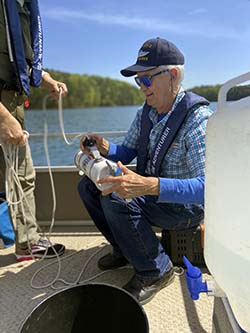
Chattahoochee Riverkeeper volunteer Tom Taylor takes water samples from Lake Lanier.
For the past 30 years, Chattahoochee Riverkeeper has been keeping watch on the water quality of Lake Lanier. The organization’s summary of findings for 2023 monitoring shows that four of the five monitoring stations have exceeded state standards, set by the Georgia Environmental Protection Division.
“While the amount of nutrients found in these four testing stations does exceed the state-set limit, there is no threat to humans,” said Becca Risser, watershed specialist with the CRK’s headwater office in Gainesville. “However, in our 13 years of lake monitoring, the past five years have seen the highest levels of nutrients in the lake since CRK began testing in 2010 and the EPD started monitoring in 2000.”
Chlorophyll-a, an indicator of nutrient levels in the lake, which results in the growth of algae, can affect water quality, including the taste and smell of drinking water. The presence of chlorophyll-a can increase the cost of treating water to meet drinking water standards and reduce the amount of oxygen levels in the water that fish and other aquatic life need to survive.
“Much of the lake’s pollution results from stormwater runoff that contains fertilizers used on farms and lawns, failing septic systems, clogged sewer pipes from improper disposal of fats, oils and grease, plus treated sewage discharges,” Risser said.
Monthly, from April through September, CRK staff and volunteers regularly monitor 10 locations around the lake for water quality: the Dam Pool, mid-lake, Browns Bridge, Lanier Bridge and Bolling Bridge, plus five creeks: Flat Creek, Balus Creek, Mud Creek, Six Mile Creek and Little River.
Water samples in Lanier are collected and analyzed for chlorophyll-a. The program includes CRK’s Neighborhood Water Watch, which regularly monitors more than 200 sites in local streams along the ACF water basin.
“Of course we and the EPD will continue to monitor these stations,” she said. “Of course, you can still swim, but this is a long-term issue we will continue to address.”
“It’s important to be aware to be aware of the situation and for people to voluntarily take actions to reduce the effects of stormwater runoff on their property, including overuse of fertilizers and pesticides,” Risser said. “We always welcome more volunteers to help us protect our water quality.”
For more information, visit Chattahoochee.org or call 404 352-9828.
Photo: courtesy CRK




